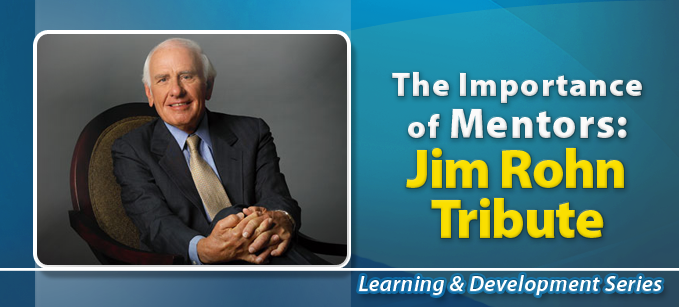The Importance of Mentors: A Tribute to Jim Rohn

For those who remember the late Jim Rohn (1930 – 2009), you will remember a man with a passion for personal development. His was the quintessential American success story of rags to riches. “A farm boy from Idaho,” he told us in his motivational talks, “raised in obscurity, broke at 25.” The young and amateurish Rohn is said to have blundered his way through business until he found a personal source of inspiration in a wealthy mentor who introduced him to the idea of personal development and the idea that his income was the result of his attitude (or, in Rohn’s particular case, the wrong one).
Rohn would go on to become VP of Nutri-Bio in 1960, a food supplements company, which at its height was making $6,000,000 per month in sales with 115,000 distributors in the USA and Canada. Rohn credited his success to his mentor, Earl Shoaff, who was a prolific entrepreneur, known as the “millionaire maker,” who also mentored the legendary motivational speaker Zig Ziglar and the founder of Mary Kay cosmetics, Mary Kay, before she became a multi-millionaire.
Rohn never fails to acknowledge his mentor throughout his lectures. It’s clear that Mr. Shoaff had a profound impact on him, and Rohn seems adamant that he never would have amounted to anything if he hadn’t come under his mentorship. Rohn, in turn, would pass on the knowledge given to him by his mentor to many other prominent names in the motivational speaking industry including Tony Robbins, Brian Tracy, T. Harv Eker, Mark Victor Hansen and Jack Canfield.
Indeed, many of the ideas shared by modern motivational speakers can be traced back to Rohn — and subsequently back to Mr. Shoaff.
So just what exactly was this “secret wisdom” that Rohn had acquired from Mr. Shoaff, the stuff that so profoundly changed his life? Rohn believed it all started with very basic ideas. Nothing fancy. Just the A.B.C’s of personal development — ideas that weren’t necessarily new or undiscovered, but were communicated to him in ways that made sense, as a man of "little education and average intelligence."
The impression that Mr. Shoaff left on Rohn is captured in this talk, which looks a bit old, but still has great relevance today:
Starts at 3 minutes 25 seconds.
A Few Favourite Quotes:
“Here’s the best lesson I can give you on economics: We get paid for bringing value to the marketplace. That’s about as simple as I can put economics. Mistakenly, the man says ‘I’m making $20 an hour.’ Not true. We don’t get paid for time, we get paid for value. Now since that’s true, here’s one of the key questions I have for you: Is it possible to become twice as valuable to the market place? Five times? Ten times? Of course. In climbing this ladder economically all you have to do is work harder on yourself than you do on your job.” — Jim Rohn
“Formal education will make you a living; self-education will make you a fortune.” — Jim Rohn
“Don't wish it were easier, wish you were better.” — Jim Rohn

Theo Winter
Client Services Manager, Writer & Researcher. Theo is one of the youngest professionals in the world to earn an accreditation in TTI Success Insight's suite of psychometric assessments. For more than a decade, he worked with hundreds of HR, L&D and OD professionals and consultants to improve engagement, performance and emotional intelligence of leaders and their teams. He authored the book "40 Must-Know Business Models for People Leaders."

/Top%2010%20Best%20Personal%20Development%20Blogs.png?width=374&name=Top%2010%20Best%20Personal%20Development%20Blogs.png)
/Learning%20Round%20Up_%20insights%20on%20HR%2c%20L%26D%20Productivity%2c%20personal%20development.png?width=374&name=Learning%20Round%20Up_%20insights%20on%20HR%2c%20L%26D%20Productivity%2c%20personal%20development.png)
We Would Like to Hear From You (0 Comments)